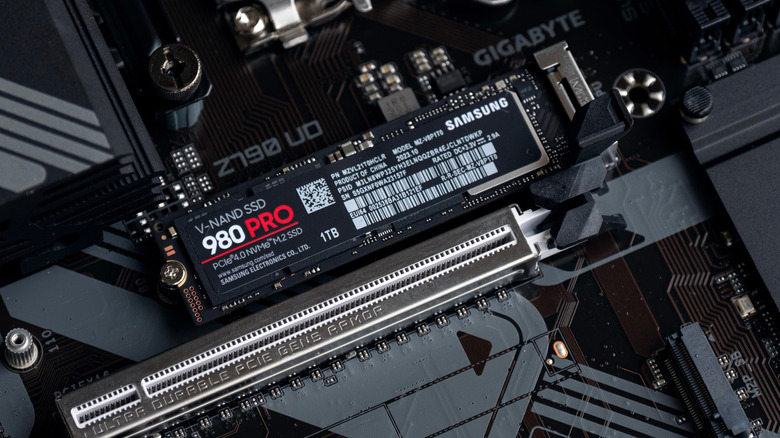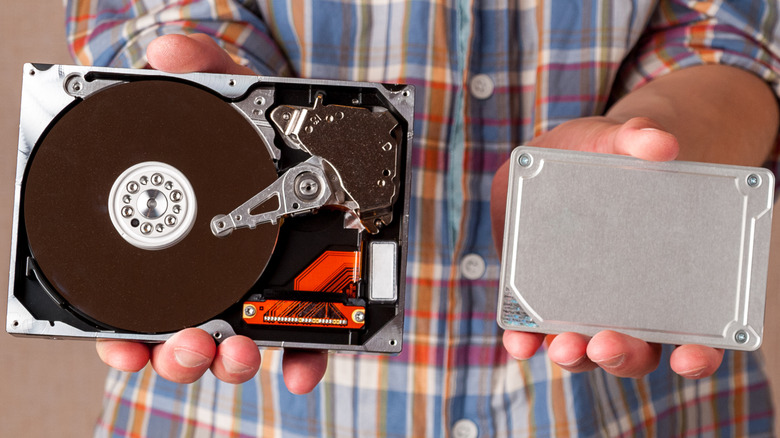Are SSDs Really More Reliable Than Hard Drives?
Solid-state drives (SSDs) use flash memory versus the physical storage technologies found in a traditional hard drive (HDD). They have no moving parts and that affords unique properties like faster access speeds, and, purportedly, better reliability. That translates to speedier boot times for an operating system, or faster load times in games and applications, as well as lower energy consumption, which saves battery life in laptops or consoles (hello, Steam Deck). However, just because everyone says SSDs are more reliable, doesn't mean it's inherently true. Do they really last longer in the real world and are they reliable long term?
Backblaze, a cloud storage provider, compared the failure rates of SSDs to HDDs to quantify if they are more reliable. The answer is, mostly, yes. Before diving in, something everyone agrees on is that drives fail more often than you'd expect. That includes SSDs, flash drives, external storage media like SD cards, regular HDDs, and networked or NAS drives. Make a habit of backing up all your important files, from legal documents and work stuff, to personal photos and videos.
The 2022 analysis from Backblaze measured reliability by tracking the annualized failure rate (AFR) of drives. The lifetime AFR for HDDs and SSDs at year four was relatively low, at 1.83% and 1.05% respectively. As time went on, those rates changed: At five years it was 3.55% (HDDs) and 0.92% (SSDs), and increased for HDDs in years six, seven, and eight, with SSD rates for those years currently unknown. "We can reasonably claim that SSDs are more reliable," says Backblaze's Andy Klein. At least in the short term, but Backblaze clarifies it's "highly certain the failure rate of SSDs will eventually start to rise."
SSDs are mostly reliable, but not always
Backblaze utilizes both SSD and HDD options in its storage servers, with over 2,500 SSDs across several brands in regular use. However, Klein also notes that the drives appear to be more reliable when "used as boot drives in [their] environment." There are many use cases for drives beyond server storage, and those scenarios matter. Server SSDs are often engineered to higher standards to handle more intense and sustained workloads versus something you might be using at home on your desktop.
Beyond that, some personal users report failure rates higher than expected with SSDs, with an explicit mention that traditional HDDs are more reliable in personal experience. Why would it seem like mechanical HDDs last longer to some and not to others? In a general sense that's because many factors contribute to the failure of a drive, not just sustained use. Generated heat, software failures like firmware problems, unintended misuse, connected technologies, drive crashes, file system errors, and bad data blocks can all influence a drive's lifespan. Even drives within the same family can have varying lifespans in the real world.
Recently, a Microsoft Windows 11 update has been reportedly "killing" some SSDs in the wild. Moreover, M2 SSDs seem to have upheld the reliability standard, while SATA SSDs don't seem to hold up as well to continued wear and tear. All SSDs can degrade over time, and while standard SSDs and SATA last longer than HDDs by a few years, their estimated lifespans are still fewer than NVMe and M2 SSDs. Ultimately, the takeaway is that all drives can fail, and one should always take the necessary precautions to protect data. Additionally, knowing the common signs your SSD is about to fail can help.

